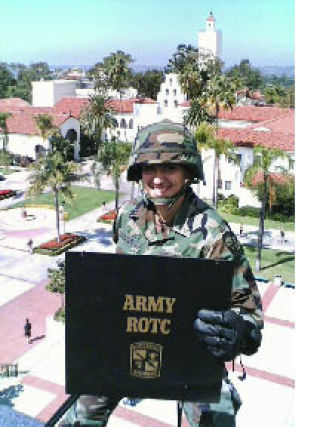For Cadet Lt. Col. Christie Plackis, Army ROTC boot camp was a time to prove herself. During four weeks of intensive training in skills ranging from navigation to weapons, as well as physical fitness, Plackis met the challenge. She emerged from “Operation Warrior Forge” on top, ranking as No. 1 out of 268 cadets in her regiment and the No. 1 female cadet nationwide.
For her accomplishments, she was awarded with a sabre engraved with her name and Fort Lewis regiment — 7th Regiment, B Troop, 2nd Platoon — last month.
Plackis credits her faith for her success.
“All of this — why I’ve gotten to where I’ve gotten, and why I’ve been able to do what I’ve been able to do — is because of God. I would be nowhere without God,” said Plackis, who enrolled in the ROTC through Mercer Island High School, where she graduated in 2005 before continuing on to San Diego State University.
Plackis joined about 6,000 cadets from all over the nation at the boot camp, or Leader Development and Assessment Course (LDAC), in Fort Lewis, Wash. LDAC is “the most important training event” for an Army ROTC cadet, according to the Western Region Cadet Command’s Web site, which describes LDAC as training that “incorporates a wide range of subjects designed to develop and evaluate leadership ability,” judged by platoon and noncommissioned officers. Cadets participate in the camp after completing three years of college. Their performance at LDAC, national ranking and GPA influence their post-graduation military assignments.
Plackis’ scores were consistently high — whether achieving the best physical fitness rating through running, push-ups and sit-ups, or 100 percent in plotting points and planning routes in a forest using a military map and compass with eight-digit coordinates.
“I’ve always wanted to serve my country and take on a challenge, and ROTC is a combination of being able to do that and go to college at the same time,” said Plackis, who is now a senior majoring in international security and conflict resolution at San Diego State.
“Mercer Island High School definitely helped prepare me for the student aspect of it in a strong way so that I could focus more on the military aspect later. Also, having recruiters at the high school got the whole ROTC idea out there. I didn’t know anything about the military — I don’t have family in the military, other than my grandparents who served. I learned most of what I learned [about the ROTC] because I went up and talked to recruiters.”
Now a battalion commander, Plackis said that one of her greatest challenges lies in supervising a class of 100 cadets — freshmen, sophomores and juniors — at San Diego State and “trying to best prepare them for going to boot camp,” as well as getting cadets in Military Science Levels I and II ready for the third level.
Plackis, now well on her way to future success, will graduate in December of 2009 and begin a new chapter in Army service. She hopes to enter into the military police force, but until next year, she must wait to see where providence will lead.



